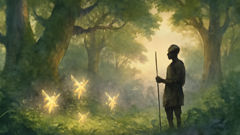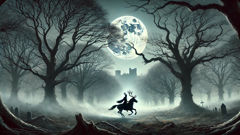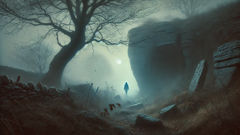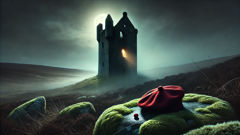Introduction
Long before the rise of kingdoms and the hum of cities, when the land that would become Benin was a tapestry of ancient trees and wild rivers, there existed a world where the boundary between the human and the magical was as thin as morning mist. Among the mighty mahogany trunks and tangled lianas, legends whispered of the Aziza—a race of gentle, dwarf-like fairies whose presence shaped the destiny of those who dared to enter their realm. To the Dahomey people, these spirits were more than mere stories told by firelight; they were guardians of the forest, keepers of sacred wisdom, and silent companions to those who lived by the rhythm of nature. Their voices, it was said, echoed in the rustling leaves and singing birds, their laughter danced atop dew-laden grass at dawn, and their footsteps left no trace but a sudden burst of wildflowers. Hunters, whose survival depended on a deep bond with the land, revered the Aziza above all. For it was to them the Aziza revealed the secrets of the forest—the hidden paths to water, the plants that healed, and the subtle ways to move unseen among prey. It was an unspoken pact: treat the forest with respect, and the Aziza would watch over you. But when darkness encroached, threatening the fragile balance between humanity and the wild, it was not strength or weapons that would save a village, but the wisdom of the Aziza and the heart of a single, determined hunter.
The Hunter and the Promise of Magic
Toko was young, but he was no stranger to the forest. Raised on the edge of his village, where the wilderness pressed close and the scent of earth and leaves lingered in every breeze, he’d grown up with stories of the Aziza. His grandmother, hunched by the fire with eyes that seemed to see through the years, would often say, “Never forget, my child: the Aziza do not reveal themselves to those who seek power for its own sake. They come to those whose hearts are open.”
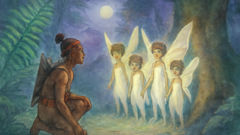
It was a lesson Toko carried into adulthood. With every hunt, he moved softly, whispering greetings to the trees and pausing to listen to the language of birds. His father had taught him to watch for signs—the flutter of wings, the sudden hush that fell over a clearing, the faint shimmer of light at the forest’s edge. But even as Toko became known for his skill and kindness, he’d never seen the Aziza with his own eyes.
One season, drought struck Dahomey. Rivers thinned to muddy trickles, and the animals vanished deeper into the forest’s heart. The people of Toko’s village grew hungry. The elders gathered, faces drawn with worry, and it was decided: someone must go beyond the familiar trails, into the forbidden depths where the Aziza were said to dwell. Toko, with his patient manner and respect for all living things, was chosen for this task.
On the morning of his journey, Toko’s mother pressed a simple charm into his palm—a string of cowrie shells threaded with a tuft of antelope hair. “For luck,” she whispered, though her eyes were clouded with fear. The villagers watched as Toko vanished beneath the green canopy, their hopes carried with him.
The deeper he ventured, the stranger the forest became. Roots knotted above ground like the arms of sleeping giants. The air shimmered with heat and possibility. Toko moved carefully, remembering his grandmother’s words. He sang to the birds and paused to mend a broken nest. At sunset, as he sat beside a trickling spring, he heard it: a faint, melodic laughter. The sound was both near and impossibly distant, echoing through the twilight shadows.
It was then that he glimpsed them—a group of tiny figures, no taller than his knee, emerging from behind a curtain of ferns. Their skin gleamed like polished wood, their hair shimmered with the hues of wildflowers, and their eyes shone with ancient light. The Aziza regarded him with curiosity and warmth, their voices overlapping like the bubbling of clear water.
“Why have you come, hunter?” asked their leader, a wise-eyed fairy with a cloak woven from spider silk and dew. Toko bowed deeply, holding nothing but his empty hands and humble intent. “My people are hungry. The rains have failed us. I seek only your wisdom—teach me how to bring life back to the land.”
The Aziza studied him in silence. At last, their leader smiled. “You come not for power, but for healing. This pleases us.” With a gesture, she invited Toko to sit among them. As moonlight filtered through the branches, the Aziza shared secrets—how to read the language of roots, how to call rain from cloudless skies, how to walk unseen by wary animals. They gave him not weapons, but knowledge: the true magic of the forest. Toko listened, heart swelling with hope and gratitude, vowing to honor the Aziza’s trust.
The Darkness That Stalked the Forest
As Toko made his way back toward the village, carrying only memories and wisdom rather than trophies or game, he felt a subtle shift in the air. Where once the trees had whispered in harmony, now their leaves rustled with unease. Shadows seemed to pool in the hollows between roots; a hush fell over bird and beast alike. Toko quickened his pace, the knowledge of the Aziza burning like a small flame in his chest.
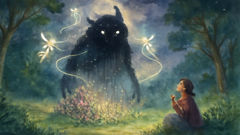
But darkness is seldom content to wait on the edge. That night, as Toko slept beneath an ancient iroko tree, he dreamt of a monstrous shape—smoke-eyed and many-toothed—slipping through the forest on silent feet. Its hunger was bottomless, its presence a chill that seeped into bone. When he woke, sweat-soaked and shivering, he saw strange footprints pressed into the earth: large, misshapen, and pointing toward his village.
By the time Toko returned, the village was in uproar. Livestock had vanished, gardens lay trampled, and an unnatural silence hung over the fields. The elders spoke in frightened tones of a beast from beyond memory, awakened by the hunger of men and the anger of neglected spirits. Many looked to Toko, expecting him to wield some new weapon against this threat. But Toko remembered the Aziza’s words: true magic is not for conquest or domination.
Instead, he gathered the children and taught them to listen to the songs of insects and the language of wind. He led the villagers in tending to the wounded earth—planting new trees, cleaning streams, mending fences torn by the beast. Each night, he left small offerings for the Aziza at the forest’s edge: honey, fruit, a whispered thank you.
Yet the darkness grew bolder. One evening, a girl vanished while fetching water. The villagers’ fear curdled into anger. Some urged Toko to call on the Aziza to destroy the beast outright. Others muttered that perhaps the hunter had failed—that perhaps he’d brought a curse instead of a blessing.
Troubled but undeterred, Toko slipped into the forest beneath a sky bruised with storm. He called softly for the Aziza, but the air remained silent. Alone, he tracked the beast’s trail—deep gouges in bark, the stench of rot—deeper into the forbidden wilds. There, in a clearing choked with thorns, he confronted the creature: a hulking thing, part shadow and part flesh, with eyes like burning coals and a mane of tangled roots.
The beast roared, shaking the air, but Toko stood firm. Remembering what he’d learned, he sang a lullaby his mother had taught him—a song of peace and rain. As his voice trembled on the wind, the Aziza appeared, their forms barely visible in the storm’s gloom. They danced around the beast, weaving strands of light and song. The creature faltered, its anger dimming as it listened to the music. Slowly, its monstrous shape softened, roots unwinding, eyes closing in sorrow.
The Aziza spoke softly to Toko. “This darkness is not your enemy. It is born of neglect—of wounds left untended. Heal the land, and you heal the beast.” Understanding dawned in Toko’s heart. He knelt, pressing his hands to the earth, whispering words of forgiveness and promise. The beast melted away, leaving only wildflowers and a gentle rain.
The Wisdom of the Aziza
With the beast gone and gentle rains returning to Dahomey, the forest and village began to heal. Crops sprouted green and strong, animals returned to graze by the riverbanks, and laughter once again filled the air. But the change ran deeper than that. The people saw in Toko’s actions a different kind of strength—one rooted not in domination but in care, humility, and a willingness to listen.
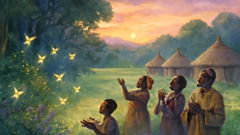
The Aziza, ever elusive, watched from the shadows. From time to time, a villager would glimpse a flash of light among the ferns or hear laughter in the rustling bamboo. They left subtle gifts for the Aziza: bowls of honey, fresh-cut flowers, and songs sung at dusk. In return, the forest seemed kinder—fruit ripened more sweetly, dangerous animals gave the village a wide berth, and illness grew rare.
Toko became a teacher as well as a hunter. He shared all he’d learned from the Aziza with anyone who wished to listen: how to read clouds for rain, how to speak kindly to plants, how to walk gently so as not to disturb sleeping spirits. The children adored him, following in his footsteps and inventing songs about Aziza magic. Even the oldest elders began to see that the world’s true balance lay in respect—between people and spirits, hunger and abundance, night and day.
One twilight, as Toko rested at the edge of the forest, he was joined by the Aziza’s leader. She looked older now, her eyes deep with time. “You have honored our gift,” she told him. “Remember: wisdom is not a treasure to be hoarded. It must be shared, or it loses its power.”
Toko bowed his head in gratitude. “I will teach as you have taught me.” The Aziza smiled, fading into the dusk. In the hush that followed, Toko felt a gentle certainty—a sense that, as long as people remembered to listen and care for the land, the Aziza would always be near.
Years passed. Seasons turned. Toko grew old, but his legend endured. Children still crept to the edge of the forest hoping to see a flicker of Aziza light. Hunters still whispered thanks to unseen guides before entering the woods. And when times grew hard, when drought or darkness threatened once more, it was not just magic or strength that saved them, but the wisdom sown by a single heart open to wonder.
Conclusion
The legend of the Aziza endures not only in Benin but wherever people look to nature with awe and humility. Their story is a reminder that magic is woven through every leaf and shadow, waiting for those who seek not to conquer but to understand. The Aziza do not choose their friends lightly; they appear to those whose hearts are open, whose intentions are pure. Their greatest gift is not a charm or spell, but wisdom: the ability to see oneself as part of a living world where every action matters. Today, when hunters step quietly beneath ancient trees or children sing songs at dusk, the spirit of the Aziza lingers—gentle, elusive, guiding all who honor the earth and its mysteries.

